B) False
Correct Answer

verified
Correct Answer
verified
True/False
If a major union goes on strike, then the country would be operating inside its production possibilities frontier.
B) False
Correct Answer

verified
Correct Answer
verified
Multiple Choice
Table 2-5 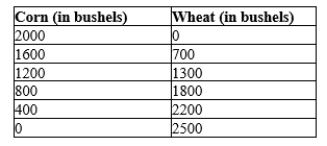 -Refer to Table 2-5. Table 2-5 shows one set of production possibilities. Which of the following statements is correct?
-Refer to Table 2-5. Table 2-5 shows one set of production possibilities. Which of the following statements is correct?
A) The opportunity cost of a bushel of corn does not depend on how many bushels of wheat are being produced.
B) The opportunity cost of a bushel of corn increases as more corn is produced.
C) The opportunity cost of a bushel of corn decreases as more corn is produced.
D) The opportunity cost of a bushel of wheat decreases as more wheat is produced.
F) A) and D)
Correct Answer

verified
Correct Answer
verified
True/False
Macroeconomics is the study of economy-wide phenomena.
B) False
Correct Answer

verified
Correct Answer
verified
True/False
When a variable that is not named on either axis of a graph changes, we read the change as a movement along the curve.
B) False
Correct Answer

verified
Correct Answer
verified
Multiple Choice
Figure 2-2 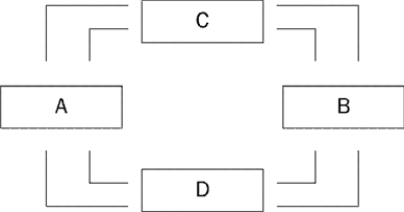 -Refer to Figure 2-2. If the outer loop of this circular-flow diagram represents flows of dollars, then the inner loop includes
-Refer to Figure 2-2. If the outer loop of this circular-flow diagram represents flows of dollars, then the inner loop includes
A) flows of goods and services from households to firms.
B) flows of inputs from households to firms.
C) flows of rent payments paid to owners of land.
D) flows of wages and salaries paid to workers.
F) C) and D)
Correct Answer

verified
Correct Answer
verified
Multiple Choice
Production is efficient if the economy is producing at a point
A) on the production possibilities frontier.
B) outside the production possibilities frontier.
C) on or inside the production possibilities frontier.
D) inside the production possibilities frontier.
F) A) and C)
Correct Answer

verified
Correct Answer
verified
Multiple Choice
Figure 2-16 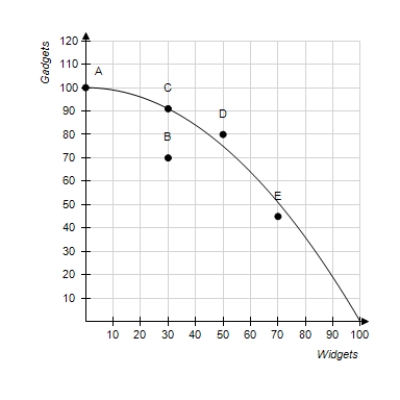 -Refer to Figure 2-16. The opportunity cost of obtaining approximately 20 additional gadgets by moving from point B to point C is
-Refer to Figure 2-16. The opportunity cost of obtaining approximately 20 additional gadgets by moving from point B to point C is
A) 0 widgets.
B) 10 widgets.
C) 20 widgets.
D) none of the above; the economy cannot move from point B to point C.
F) B) and D)
Correct Answer

verified
Correct Answer
verified
Multiple Choice
In constructing models, economists
A) leave out equations, since equations and models tend to contradict one another.
B) ignore the long run, since models are useful only for short-run analysis.
C) sometimes make assumptions that are contrary to features of the real world.
D) try to include every feature of the economy.
F) All of the above
Correct Answer

verified
Correct Answer
verified
Multiple Choice
"Prices rise when the quantity of money rises rapidly" is an example of a
A) negative economic statement.
B) positive economic statement.
C) normative economic statement.
D) statement that contradicts one of the basic principles of economics.
F) C) and D)
Correct Answer

verified
Correct Answer
verified
Multiple Choice
Figure 2-5 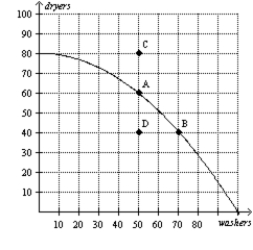 -Refer to Figure 2-5. Suppose this economy is producing at point D. Which of the following statements would best explain this situation?
-Refer to Figure 2-5. Suppose this economy is producing at point D. Which of the following statements would best explain this situation?
A) The economy has insufficient resources to produce at a more desirable point.
B) The economy's available technology prevents it from producing at a more desirable point.
C) There is widespread unemployment in the economy.
D) Any of the above statements would be a legitimate explanation for this situation.
F) A) and B)
Correct Answer

verified
Correct Answer
verified
Multiple Choice
Which of the following statements applies to economics, as well as to other sciences such as physics?
A) Experiments are considered valid only when they are conducted in a laboratory.
B) Good theories do not need to be tested.
C) Real-world observations often lead to theories.
D) Economics, as well as other sciences, is concerned primarily with abstract concepts.
F) B) and C)
Correct Answer

verified
Correct Answer
verified
Short Answer
Who would be more likely to study the inflation rate in the United States, a macroeconomist or a microeconomist?
Correct Answer

verified
Correct Answer
verified
Short Answer
Who would be more likely to study the effects of government spending on the unemployment rate, a macroeconomist or a microeconomist?
Correct Answer

verified
Correct Answer
verified
True/False
There is only one explanation for why economists give conflicting advice on policy issues, and it is that they have different values about what policy should try to accomplish.
B) False
Correct Answer

verified
Correct Answer
verified
Multiple Choice
Figure 2-6 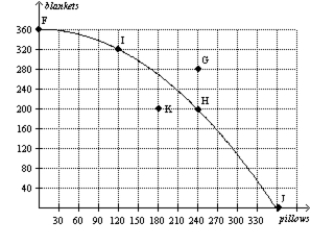 -Refer to Figure 2-6. If this economy moves from point F to point G, then which of the following statements is correct?
-Refer to Figure 2-6. If this economy moves from point F to point G, then which of the following statements is correct?
A) This economy has moved from a point of inefficient production to a point of efficient production.
B) This economy has experienced economic growth.
C) This economy has experienced an increase in employment.
D) None of the above is correct.
F) C) and D)
Correct Answer

verified
Correct Answer
verified
Multiple Choice
Which of the following is a positive, as opposed to a normative, statement?
A) The US Department of Justice should allow a merger between AT&T and T-Mobile because it would have little effect on consumers.
B) Antitrust laws should be used to prevent further concentration in the wireless telephone service market.
C) The US Department of Justice sued AT&T to block its merger with T-Mobile.
D) The wireless telephone service market is too highly concentrated.
F) None of the above
Correct Answer

verified
Correct Answer
verified
True/False
While the production possibilities frontier is a useful model, it cannot be used to illustrate economic growth.
B) False
Correct Answer

verified
Correct Answer
verified
Short Answer
Just like other scientific models, economic models simplify reality using
Correct Answer

verified
Correct Answer
verified
Short Answer
Figure 2-22 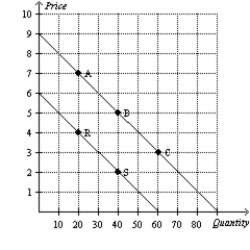 -Refer to Figure 2-22. What is the slope of the line with points A, B, and C?
-Refer to Figure 2-22. What is the slope of the line with points A, B, and C?
Correct Answer

verified
Correct Answer
verified
Showing 361 - 380 of 643
Related Exams